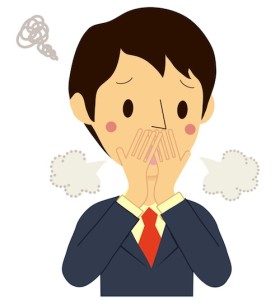Bad breath, or halitosis, is something that affects most adults at some point. Even though the medical condition is common, it can still leave you feeling embarrassed and self-conscious. To save you from that uncomfortable position, Overland Park Dentistry took a look at common causes of halitosis and broke down the steps you can take to avoid the dreaded dragon breath.
Causes of Halitosis

- Bacteria—Our mouths are home to hundreds of bacteria. These bacteria feed on the tiny food particles that remain in our mouths after we eat. The bacteria then produce a waste product that can cause bad breath.
- Dry Mouth—If you don’t produce enough saliva, food particles and bacteria can remain in the mouth and cause bad breath. Mouth breathing, medications, and problems with the salivary glands are common causes of dry mouth.
- Plaque—Cavity-causing bacteria can build up on the teeth and under the gums leading to gum disease. Individuals with advanced gum disease often suffer from chronic bad breath and a persistent bad taste in their mouth.
- Food—As we digest food, it is absorbed into the bloodstream and carried throughout the body, including the lungs. The strong smells of foods like onions, garlic, and coffee are then given off in the air that we exhale.
- Smoking—Smoking stains the teeth, affects your sense of taste and smell, and irritates gum tissue, which can lead to gum disease. The smell of tobacco also lingers on your hair, clothes, and breath.
- Medical Conditions—Acid reflux, sinus infections, diabetes, and liver and kidney conditions can all affect a person’s breath.
Preventing Bad Breath:
Daily flossing and twice-daily brushing are the most effective methods of removing the bacteria and food particles that can cause bad breath. When you brush your teeth, you should also clean your tongue with a toothbrush or tongue scraper. If you wear dentures, make sure to clean them each night. Mouthwash can also help to neutralize bad breath temporarily. Sugar-free gum and foods like apples and carrots can help increase saliva production and prevent dry mouth.
If you are suffering from chronic bad breath, make an appointment with Overland Park Dentistry today. A checkup will help determine if your halitosis is due to more serious, persistent conditions such as dry mouth or gum disease. You can reach our North Overland Park office at 913-341-2380 or our South Overland Park office at 913-647-8700.
